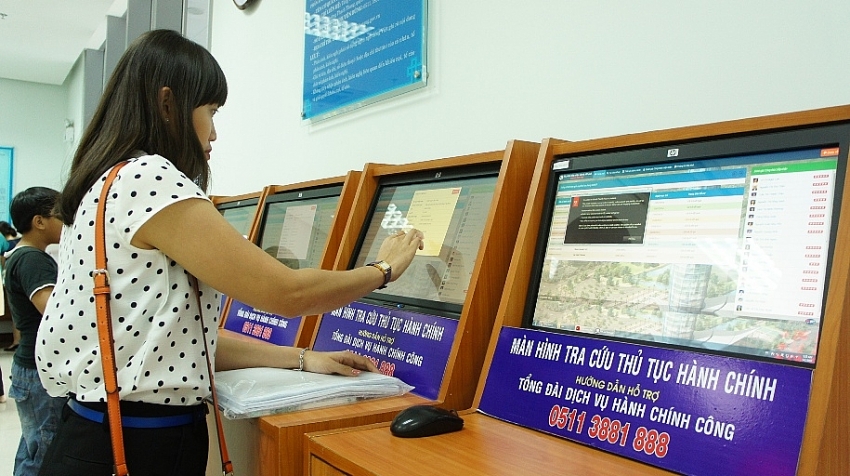Simplifying administrative procedures for economic growth
 |
| Each year, new laws simplify more and more administrative procedures to buttress economic growth (Image source: VGP) |
The series of Resolution No.19/ND-CP on improving the business environment and national competitiveness that have been issued at the beginning of each year since 2014, has cut and simplified more than 50 per cent of a total of 6,000 business conditions while there have been improvements in most indexes, including the global innovation index, global competitiveness index, and the logistics performance index.
"Over the past years, on every January 1, the government issued the year's Resolution No.19 (which is Resolution No.02 on tasks and solutions to improve business environment and national competitiveness this year). This confirms the determination of the government to improve the business climate and national competitiveness," Dau Anh Tuan, head of Legislation Division of the Vietnam Chamber of Commerce and Industry (VCCI) said at the workshop on reforming for an enabling business environment and better competitiveness: achievements, lessons, and orientations for 2021-2025 held by the Central Institute for Economic Management (CIEM), Aus4Reform, and Australian Aid last week.
Businesses have also reported significant improvements in the past years. However, there remain some unnecessary, unreasonable, and unclear business conditions that may lead to complications and misunderstandings over implementation by state management agencies. Dau Anh Tuan said that although 50 per cent of business conditions have been addressed, but in fact only about 20 per cent have bee axed while the rest were simplified.
“Therefore, enterprises did not see a great deal of change in reality," Nguyen Minh Thao, head of CIEM's Business Climate and Competitiveness Division said.
Dinh Viet Thanh, representative of Garment 10 JSC said they face some difficulties with administrative procedures, as ministries keep passing on responsibilities to each other or make impossible requirements and documents. Furthermore, complaints addressed to the government are usually met with the government assigning ministries to answer. Thus, further simplification of administrative procedures would be welcome.
The summary report on implementing Resolution 02 of the Ministry of Planning and Investment also highlights that there remain barriers to business, containing numerous risks and the improvement is not very sustainable. So it is still a large distance between Vietnam's business environment and Singapore, Malaysia, and Thailand, and it is quite hard for Vietnam to be in the ASEAN-4.
Thereby, Dau Anh Tuan from the VCCI proposed continuing the implementation of solutions in Resolution 02 like cutting down barriers for enterprises; protecting the freedom of business; innovating law-making towards transparency and reducing conflicts; boosting competition; protecting property rights, intellectual property, and promoting creative industries.
The expert Nguyen Dinh Cung said that improving the business environment is an impressive point of reforming the process. Notably, in Resolution 02 this year, the government asks to implement the tasks related to digital transformation in line with the Decision No.749/QD-TTg dated June 3, 2020 on introducing program for national digital transformation by 2025 with orientations towards 2030, which is reasonable in the pandemic situation to digitalise both the government and enterprises.
Cung said that if the implementation and performance are good, these will contribute to a breakthrough and trust to carry out a 5-year Socioeconomic Development Plan and 10 -year strategy. "In addition to reforming administrative procedures, improving the business environment, enhancing competitiveness, we should also pay attention to build and develop market types and production to mobilise and use all resources," emphasised Cung.
What the stars mean:
★ Poor ★ ★ Promising ★★★ Good ★★★★ Very good ★★★★★ Exceptional
 Tag:
Tag:
Related Contents
Latest News
More News
- Masan Consumer names new deputy CEO to drive foods and beverages growth (February 23, 2026 | 20:52)
- Myriad risks ahead, but ones Vietnam can confront (February 20, 2026 | 15:02)
- Vietnam making the leap into AI and semiconductors (February 20, 2026 | 09:37)
- Funding must be activated for semiconductor success (February 20, 2026 | 09:20)
- Resilience as new benchmark for smarter infrastructure (February 19, 2026 | 20:35)
- A golden time to shine within ASEAN (February 19, 2026 | 20:22)
- Vietnam’s pivotal year for advancing sustainability (February 19, 2026 | 08:44)
- Strengthening the core role of industry and trade (February 19, 2026 | 08:35)
- Future orientations for healthcare improvements (February 19, 2026 | 08:29)
- Infrastructure orientations suitable for a new chapter (February 19, 2026 | 08:15)


























 Mobile Version
Mobile Version